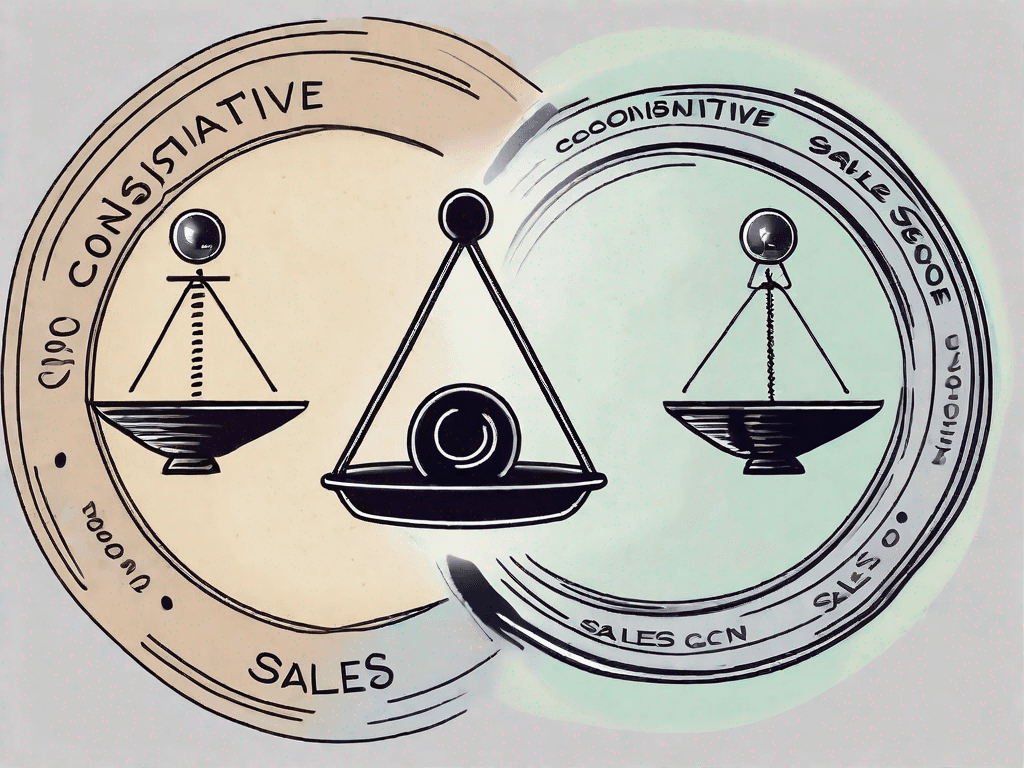
Account Executive vs Sales Manager: What's the Difference?
In the world of business, certain roles may seem similar on the surface but have distinct differences when it comes to responsibilities and functions. Two such roles in the field of sales are Account Executives and Sales Managers. While they may both be involved in driving sales and revenue for a company, their specific roles and tasks differ significantly.
For example in my software, Breakcold, both roles use the software in different ways which reflect what they do.

Defining Account Executive and Sales Manager
Before delving into the differences between an Account Executive and a Sales Manager, let's first define each role individually.
What is an Account Executive?
An Account Executive is responsible for building and maintaining relationships with clients. They act as the primary point of contact for clients and ensure their needs are met. Account Executives focus on nurturing existing client relationships and identifying opportunities for upselling or cross-selling.
Account Executives possess excellent communication and interpersonal skills. They are adept at building rapport with clients and understanding their unique requirements. By maintaining a deep understanding of the client's business and industry, Account Executives can provide tailored solutions that address specific challenges and drive value.

In addition to client relationship management, Account Executives are also involved in prospecting new clients and presenting proposals to win new business. They conduct market research to identify potential leads and develop strategies to engage with them effectively. By leveraging their industry knowledge and expertise, Account Executives position themselves as trusted advisors to clients, guiding them towards the best solutions for their needs.
What is a Sales Manager?
A Sales Manager, on the other hand, oversees a team of sales representatives. They are responsible for setting sales goals, developing sales strategies, and managing the performance of the sales team. Sales Managers play a crucial role in guiding and coaching their team members to achieve their targets.
Effective Sales Managers possess strong leadership and motivational skills. They provide guidance and support to their team, helping them navigate challenges and maximize their potential. By setting clear expectations and providing regular feedback, Sales Managers create a culture of accountability and continuous improvement within the sales team. The career of a Sales Manager is particularly promising if you are considering online job opportunities.

In addition to managing the team, Sales Managers also analyze sales data, identify market trends, and make recommendations to improve the sales process. They collaborate with other departments, such as marketing and product development, to ensure alignment and drive overall business growth. By staying abreast of industry developments and emerging market trends, Sales Managers can make informed decisions and adapt their strategies to stay competitive.
Furthermore, Sales Managers are responsible for forecasting sales targets and monitoring progress towards those goals. They utilize various tools and metrics to track performance and identify areas for improvement. By analyzing sales data and market insights, Sales Managers can identify opportunities for growth and develop strategies to capitalize on them.
In summary, while Account Executives focus on building and maintaining client relationships, Sales Managers oversee the sales team and drive overall sales performance. Both roles are essential for the success of a company, and their collaboration is crucial in achieving sustainable business growth.
What's the difference between an Account Executive and a Sales Manager?
Now that we have a better understanding of the roles, let's explore the key differences between an Account Executive and a Sales Manager.
Account Executives typically work directly with clients, whereas Sales Managers oversee a team of sales representatives. Although both roles involve sales, their focuses and responsibilities differ.
An Account Executive's main objective is to build and nurture relationships with clients. They dedicate their time to understanding the clients' needs, identifying opportunities for growth, and providing personalized solutions. Account Executives are often the face of the company for their clients and act as trusted advisors.
When working with clients, Account Executives go above and beyond to ensure customer satisfaction. They conduct in-depth research on the clients' industries, competitors, and market trends to provide valuable insights and recommendations. Account Executives also collaborate closely with other departments within the company, such as marketing and product development, to tailor their solutions to meet the clients' specific needs.
On the other hand, Sales Managers are responsible for guiding and directing a team of sales representatives. They set targets, develop strategies, and monitor performance. Sales Managers work behind the scenes to ensure the sales team has the necessary support and resources to succeed. Their focus is on managing and growing the sales pipeline, rather than working directly with clients. They work to optimize the sales process and maximize the team's productivity.
In addition to overseeing the sales team, Sales Managers also play a crucial role in recruitment and training. They identify and hire talented individuals who have the potential to drive sales growth. Sales Managers provide ongoing coaching and development opportunities to their team members, equipping them with the skills and knowledge needed to excel in their roles. They also conduct regular performance evaluations and provide feedback to help their team members reach their full potential.
Furthermore, Sales Managers are responsible for analyzing sales data and market trends to identify opportunities for improvement. They use this information to make informed decisions and adjustments to the sales strategy. Sales Managers also collaborate with other departments, such as finance and operations, to ensure seamless coordination and alignment of goals.
In summary, while both Account Executives and Sales Managers are involved in sales, their roles and responsibilities differ significantly. Account Executives focus on building relationships with clients and providing personalized solutions, while Sales Managers oversee a team of sales representatives and work to optimize the sales process. Both roles are essential for driving sales growth and ensuring customer satisfaction.
Examples of the Difference between an Account Executive and a Sales Manager
Example in a Startup Context

In a startup context, an Account Executive may be responsible for identifying potential clients, nurturing relationships, and securing new business. They would focus on personalized outreach and understanding the unique needs of each client.
Alternatively, a Sales Manager in a startup may be leading a small sales team and implementing sales strategies to drive growth. They would focus on optimizing processes, training team members, and ensuring the team meets its targets.
Example in a Consulting Context
In a consulting firm, an Account Executive may work closely with clients to assess their needs, propose tailored solutions, and negotiate contracts. They would serve as the main point of contact for ongoing client communications and inquiries.
A Sales Manager in a consulting firm, on the other hand, would oversee a team of consultants and guide them in identifying and winning new projects. They would analyze market trends, align the sales team's efforts, and ensure the consulting firm remains competitive in the industry.
Example in a Digital Marketing Agency Context
In a digital marketing agency, an Account Executive would collaborate with clients to understand their marketing goals and develop comprehensive strategies. They would ensure that the clients' digital marketing campaigns are on track, provide regular updates, and suggest optimizations to improve performance.
A Sales Manager in a digital marketing agency would lead a team of account executives and coordinate their efforts to meet the agency's sales targets. They would analyze market trends, identify potential clients, and ensure the agency's services are effectively marketed.
Example with Analogies
To better illustrate the differences, we can compare an Account Executive to a personal concierge at a luxury hotel. Like a concierge, an Account Executive works closely with clients to understand their preferences, anticipate their needs, and provide tailored solutions.
A Sales Manager, on the other hand, can be compared to a general manager of a hotel. They oversee the entire sales team, ensuring each department is performing effectively, managing budgets, and working towards the overall success of the hotel.
In conclusion, while both Account Executives and Sales Managers play crucial roles in driving sales, they differ in their responsibilities and the scope of their work. Account Executives focus on building and maintaining client relationships, while Sales Managers oversee a team and drive the overall sales strategy. Understanding these distinctions is essential for businesses looking to optimize their sales efforts and achieve sustainable growth.


















































































































































